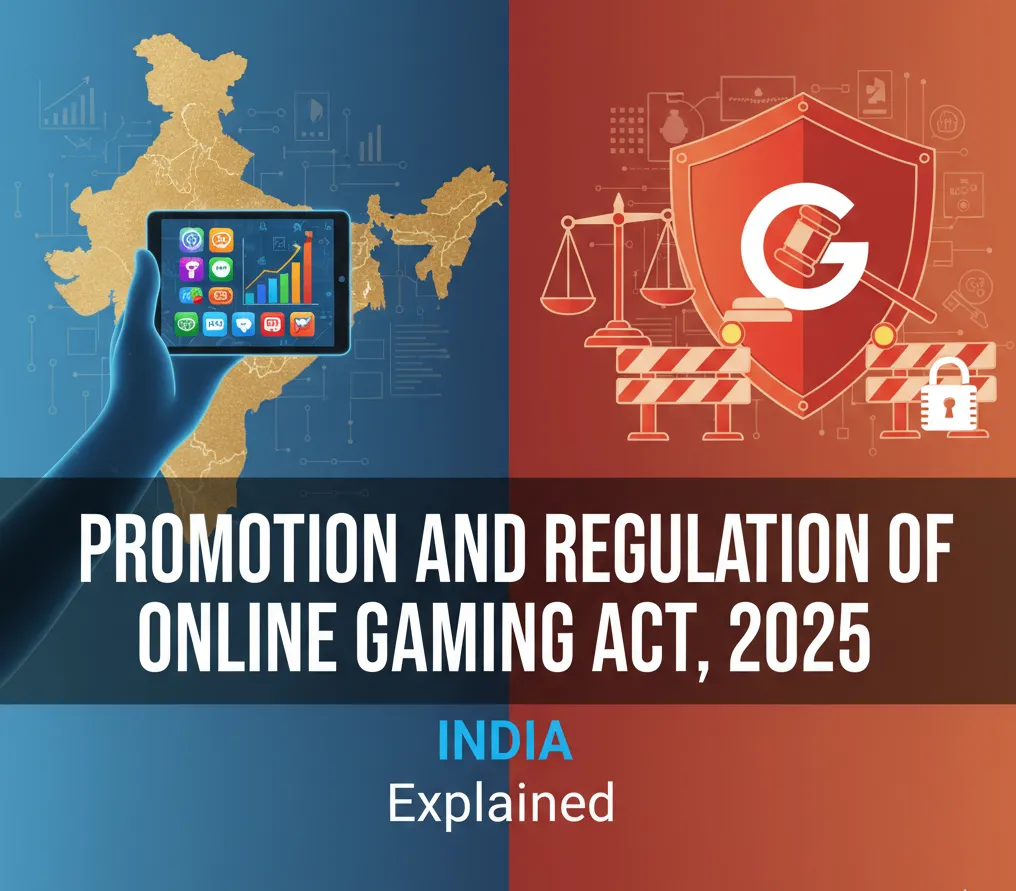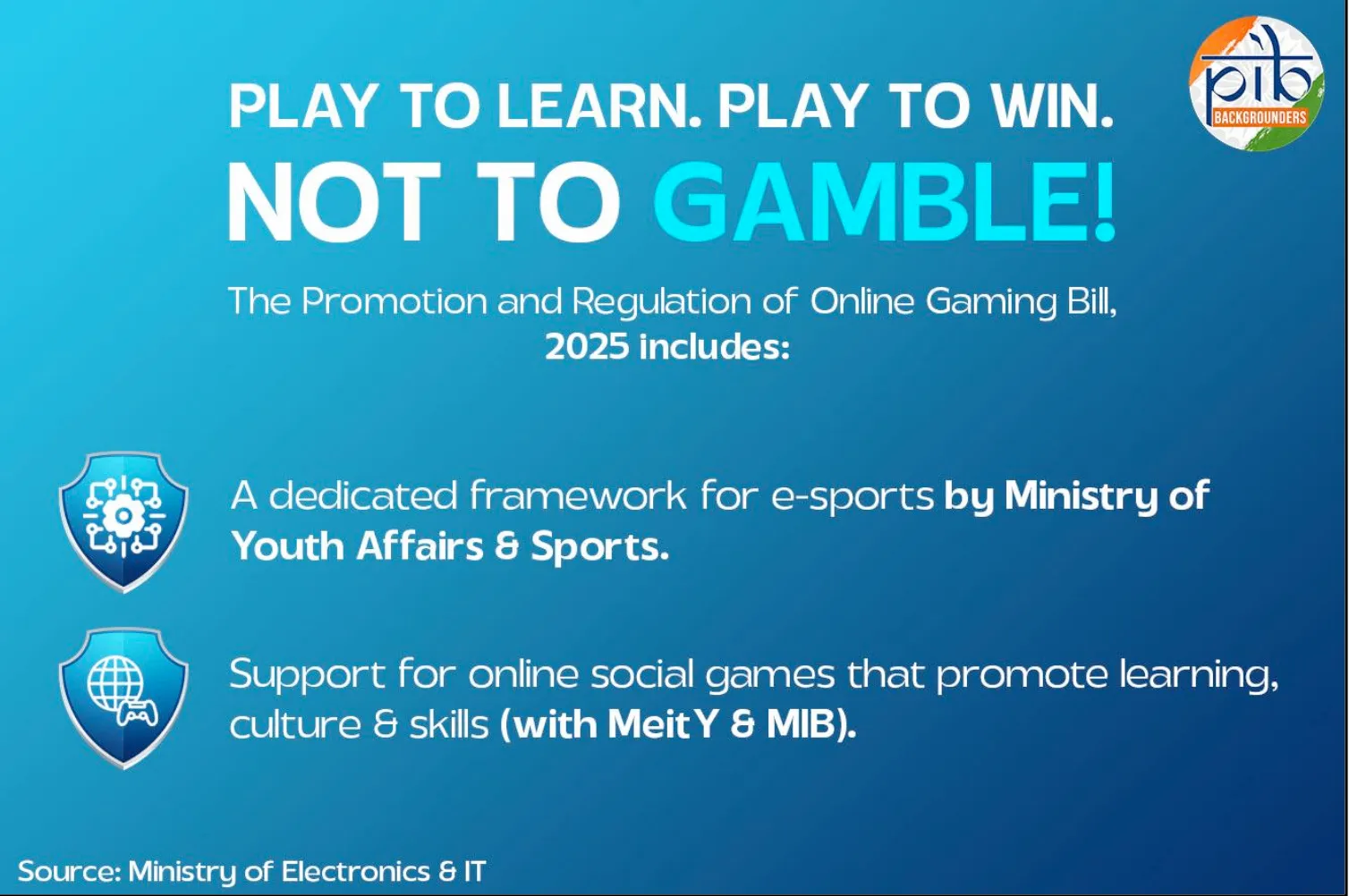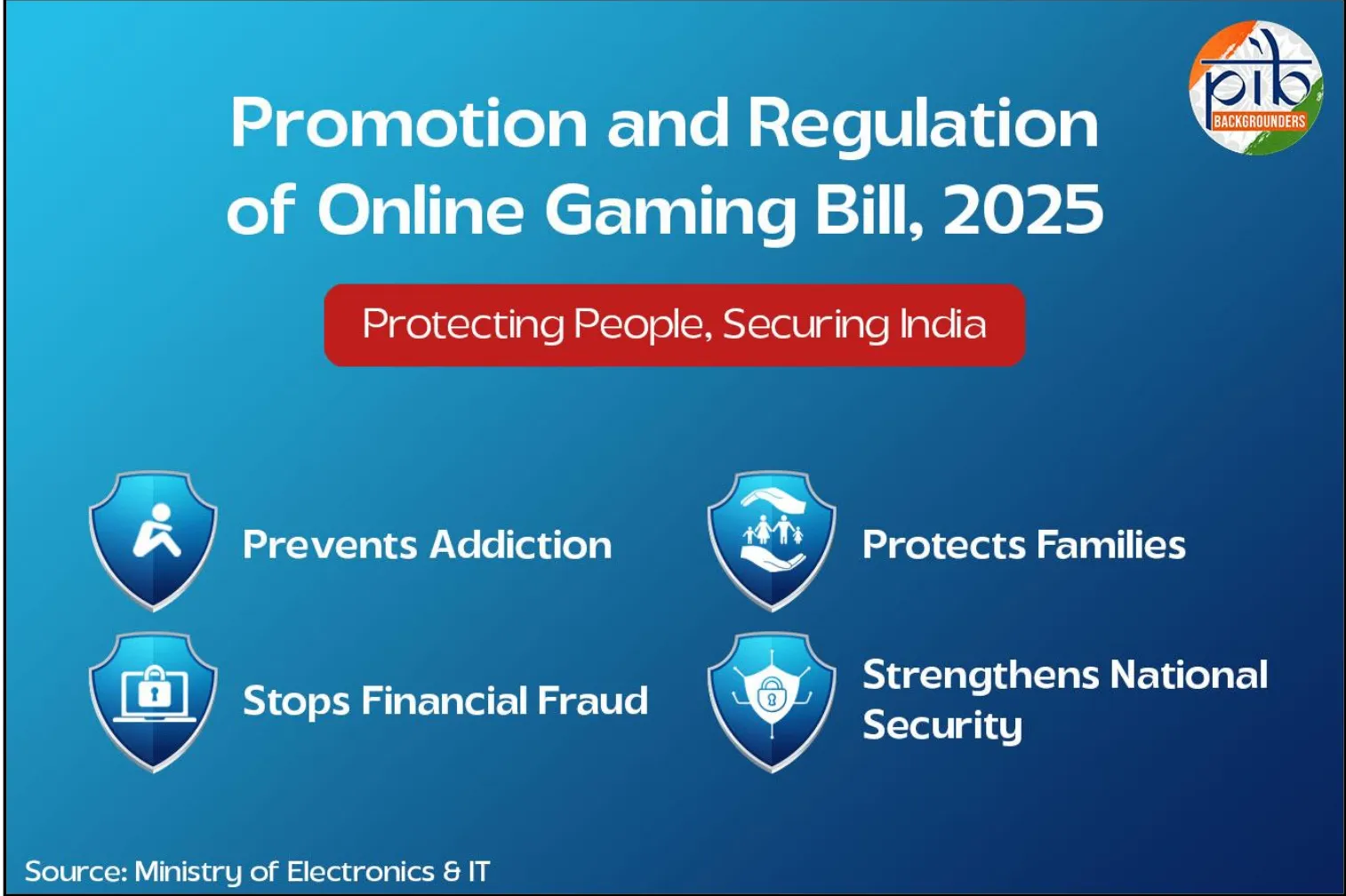Promotion and Regulation of Online Gaming Act, 2025 (India): Explained
05 Nov 2025
India’s New Online Gaming Law: What You Need to Know
Online games are growing very fast in India. More people now play on phones, tablets, and computers. You may see many kinds of games, such as fantasy sports where you pick a team, skill-based games that use thinking and practice, esports with big tournaments, and online casinos with virtual tables and slots. These games are fun, social, and easy to join from home.
Still, there are many concerns. Some players spend too much time playing and may find it hard to stop. Others can lose money quickly if they do not set limits. There is also the risk of children getting access when they should not. Sometimes, advertisements are unclear, and a few games may not be fair. Because of these issues, many families and teachers want clear rules to keep players safe.
The Promotion and Regulation of Online Gaming Act, 2025 is a landmark new law for India. It aims to make play safe, fair, and responsible, while also helping good companies grow. This article explains the main parts of the Act and how it affects everyone involved in the industry.
Background: Why India Needed a Central Law
Before this law, each state had its own gaming rules. This created confusion for companies and players, especially when games operated across different states or were run by offshore businesses. The new central law sets one standard for the whole country, giving clarity and stability to everyone involved.
There was also long-running confusion between games of skill and games of chance. Some platforms used this grey area to avoid regulation. The new law addresses that by focusing on harm — if a game involves real money and can cause loss or addiction, it’s treated as a money game and faces strict limits.
Illegal betting websites and offshore casinos were another major concern. These sites caused financial loss, addiction, and even security risks. The Act gives the government stronger powers to block such platforms, stop their payments, and act against operators based outside India.
Key Provisions of the Online Gaming Act, 2025
The Act sets out simple but powerful rules to make gaming safer, fairer, and more transparent. It aims to protect players, stop harmful money games, and support esports and social games that promote learning and entertainment.
Definition of Online Gaming
The Act divides online gaming into three groups: esports, social or educational games, and online money games. Esports are competitive and skill-based, while social games are designed for safe recreation. Online money games involve staking real money and are treated as harmful because they can lead to addiction and fraud.
Central Regulatory Authority
A new national Online Gaming Authority will oversee registration, categorisation, and enforcement. This body will decide which games qualify as money games, issue licences, and ensure fair grievance systems. It will also promote esports and safe digital entertainment while taking strict action against unlawful platforms.

Licensing and Registration
All lawful games must be registered with the Authority. This ensures only compliant, transparent platforms can operate. Companies offering banned money games or avoiding registration face enforcement actions and digital blocking orders.
Advertising and Promotions
The Act bans advertisements for online money games, including misleading or disguised content. Influencers, media, and advertisers face penalties for promoting such platforms. Government campaigns will focus instead on digital literacy and responsible play.
Taxation and Revenue
Offshore and illegal platforms must now register under the GST system to ensure fair taxation. Authorities can block access to non-compliant sites, protecting both consumers and government revenues.
Age and Verification Checks
Strict verification processes will ensure children cannot access harmful games. Parents and teachers will receive guidance on digital safety, while platforms must meet national standards for data and user protection. Learn more in our overview of India’s best casino apps and how they manage verification.
Player Protection
Banks and payment processors are prohibited from handling transactions for banned money games. Awareness campaigns will teach users to identify fraud and avoid risky behaviour. Players can also report online gaming scams through the National Cyber Crime Reporting Portal and helpline 1930.
Penalties and Enforcement
Offering or promoting illegal online money games can result in up to three years of imprisonment and fines reaching ₹1 crore. Advertising such games can bring up to two years in jail and a ₹50 lakh fine. Key offences are cognisable and non-bailable, and authorities can search, seize, and block sites without a warrant in certain cases.

Challenges and Criticisms
Some experts argue that a total ban on real-money gaming could hurt innovation and drive businesses abroad. Others believe strict rules are essential to prevent addiction and fraud. The debate continues over whether regulation with safeguards—like age gates and spending limits—might work better than outright prohibition. Explore related discussions in our feature on India’s online gambling states.
Several state governments have raised concerns that the central law may interfere with their own powers under India’s Constitution. There are also legal questions about treating all money games the same, even those based on skill. Multiple petitions have already reached the Supreme Court, so further legal clarification is expected in 2026.
The Online Gaming Bill | No punishment for those playing online games. No punishment to victims. Only punishment for service providers, advertisers, promoters and those who support financially to such games: Sources
— ANI (@ANI) August 20, 2025
Industry groups also warn that higher taxes and strict audits could make operations costly, reducing investment and employment in the gaming sector. Some fear this could push developers and talent to friendlier markets abroad.
The proposed online gaming bill, The Promotion and Regulation of Online Gaming Bill, 2025 is being introduced without industry consultation, is a knee-jerk reaction that could prove counterproductive. It risks creating significant national security concerns by driving financial…
— Karti P Chidambaram (@KartiPC) August 20, 2025
Global Comparison of Online Gaming Regulations
| Region / Country | Regulatory Approach | Key Features | Impact / Notes |
|---|---|---|---|
| United Kingdom | Licensed and regulated market | Mandatory operator licensing; strict age verification; ad controls; responsible-gambling tools | Enables innovation and strong tax revenue with high player protection |
| United States | State-level licensing | Legal in select states (e.g., NJ, NV); geolocation; compliance audits; action vs. unlicensed operators | Supports jobs and tax revenue without nationwide legalisation |
| Singapore | Limited, tightly supervised | Blocks illegal sites; permits limited licensed activity; strong age/payment controls | Lowers gambling harm via strict monitoring and limited permissions |
| Australia | Partial regulation | Online casinos banned; licensed sports betting; national blocking & compliance actions | Protects consumers while maintaining a controlled betting market |
| India (2025 Act) | Strict national ban on online money games | Promotes esports/social/educational games; bans real-money gaming & ads; central site/payment blocking | May push investment/talent abroad; outcomes hinge on court rulings |
Future Outlook for India’s Online Gaming Market
| Market Growth: | Growth to centre on esports, educational, and social gaming; compliant studios can still attract investment if rules stay stable |
|---|---|
| New Technologies: | Metaverse and blockchain titles require strict age checks, data safety, and transparent payments before large-scale rollout |
| Possible Changes: | Courts and amendments may refine licensing, clarify treatment of skill-based games, and update ad/verification standards |
| India’s Role: | Less likely to be a real-money hub; potential to lead Asia in esports, learning-focused, and family-safe digital gaming |
FAQs
Is online gaming legal in India after the 2025 Act?
Yes. Esports and social games offered by licensed platforms are legal. Online money games with real stakes are banned, and the government can block payments and ads promoting them.
What is the difference between skill and chance games under the law?
The Act removes the distinction for real-money play. Any game involving monetary stakes is considered harmful, while esports and social games without money are encouraged.
How are winnings taxed under the new Act?
Platforms must comply with GST rules, including offshore operators under the IGST framework. Player winnings remain taxable under income tax laws outside this Act.
Who regulates online gaming in India now?
A central Online Gaming Authority will oversee licensing, compliance, and enforcement. It can block illegal sites, manage grievance systems, and promote safe digital gaming nationwide.
